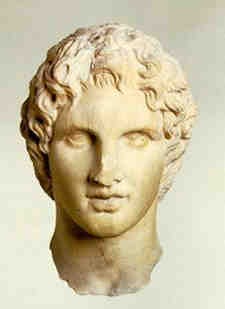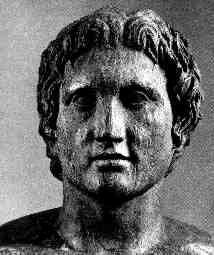King Philip of
Macedonia conquered most of the Greek  city-states.
Philip was planning to attack Persia when he was
assassinated in 336BC.
city-states.
Philip was planning to attack Persia when he was
assassinated in 336BC.
Philip's son, Alexander,
was only twenty years old when his father died, but he
was prepared to be king. The Greeks believed they could
free themselves of Macedonia rule, since the new king was
a "mere boy." Alexander proved them wrong by capturing
the city of Thebes. He destroyed the entire city as a
warning to the others. Then Alexander turned his
attention to Persia, the longtime enemy of Greece, and
the mightiest empire in the world.
Alexander left part of
his army at home to control Greece. His army was much
smaller than the Persian forces, but Alexander's army won
a series of victories and conquered Persia. Alexander was
a military genius, some people say the greatest warrior
of all time. His troops were better trained and organized
than the Persian army. His soldiers also admired
Alexander because of his personal courage. Alexander led
his soldiers in battle instead of remaining behind the
lines. The troops saw that Alexander was sharing their
danger, and was not asking them to take any risks he
would not take himself.
Once he conquered the
Persians, Alexander quickly assembled a huge empire. In
332BC, he moved south to Egypt,
where he rested his troops. The Egyptians welcomed
Alexander as a hero because he freed them from harsh
Persian rule. They crowned him pharaoh and declared him a
god.
Alexander eventually
conquered Babylon and created an empire that reached
India. He believed that the Greeks were the most advanced
people in the world, and that all other cultures were
barbarians. Once he defeated the Persians, he came to see
them very differently. He saw that many Persians were
intelligent people and were worthy of his respect.
Alexander accepted many Persians into his army and
married the daughter of a Persian king.
In
323BC, when Alexander was only
thirty-three years old,  he
fell ill from a fever and died a week later. Alexander
had created a huge empire in only thirteen years, but it
quickly crumbled. Alexander's mother, wives, and children
were all killed in the struggle for power that followed
his death. In the end, his empire was dived in three
parts among his generals.
he
fell ill from a fever and died a week later. Alexander
had created a huge empire in only thirteen years, but it
quickly crumbled. Alexander's mother, wives, and children
were all killed in the struggle for power that followed
his death. In the end, his empire was dived in three
parts among his generals.
Alexander changed the
world, but not because of his accomplishments on the
battlefield. He carried the ideas of the Greeks and their
love of learning throughout his empire. He founded the
great city of Alexandria, which became a center of
learning and culture in Egypt. A library in Alexandria
housed the accumulated knowledge of the Greeks. This
would become very important in the centuries that
followed because Greece and Rome would fall to barbarian
tribes would could not read.
 city-states.
Philip was planning to attack Persia when he was
assassinated in 336BC.
city-states.
Philip was planning to attack Persia when he was
assassinated in 336BC.
 he
fell ill from a fever and died a week later. Alexander
had created a huge empire in only thirteen years, but it
quickly crumbled. Alexander's mother, wives, and children
were all killed in the struggle for power that followed
his death. In the end, his empire was dived in three
parts among his generals.
he
fell ill from a fever and died a week later. Alexander
had created a huge empire in only thirteen years, but it
quickly crumbled. Alexander's mother, wives, and children
were all killed in the struggle for power that followed
his death. In the end, his empire was dived in three
parts among his generals.